CONTINUE READING AFTER THIS ADVERTISEMENT
African cycling under threat
MTN-Qhubeka's recent success at the Tour de France has catapulted Africa cycling into the limelight. The 'David and Goliath' exploits of African riders have showcased the continent's potential as a source of top-level athletes. In addition, their attacking style has thrilled fans and won them respect within and outside the European peloton. This is perhaps best exemplified by Eritrean rider Daniel Teklehaimanot, the outright winner of the 'Mountains Classification' at the Critérium du Dauphiné and holder of the 'mountains jersey' for the first week of the Tour de France. African cycling's success is unquestionably underpinned by the work of the World Cycling Centre Africa (WCCA), but as the world celebrates the fruits of their labours, the roots of African cycling are under threat.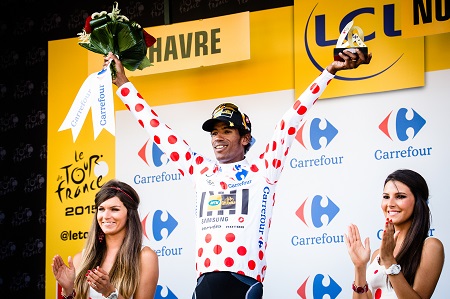
Daniel Teklehaimanot wearing the polka dot jersey at the 2015 Tour de France. Picture courtesy of GruberImages
The powerhouse of African cycling
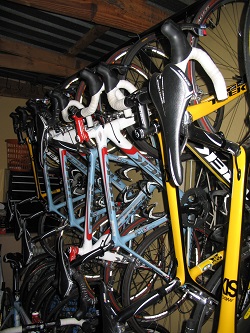 The World Cycling Centre Africa (WCCA) is based in the South African town of Potchefstroom. Located just over an hour's drive from Johannesburg, it comprises a single story bungalow with dormitory bedrooms for the riders. Lacking stainless steel and mirrored glass, it is a little more modest than the World Cycling Centre in Switzerland. Despite its apparent deficiencies, the ethos of the WCCA is the same as its Swiss counterpart: provision of elite coaching and training to develop young riders. Over the past 10 years the WCCA has proved to be the powerhouse of African cycling, but now its very existence and the future of African cycling are under threat.
The World Cycling Centre Africa (WCCA) is based in the South African town of Potchefstroom. Located just over an hour's drive from Johannesburg, it comprises a single story bungalow with dormitory bedrooms for the riders. Lacking stainless steel and mirrored glass, it is a little more modest than the World Cycling Centre in Switzerland. Despite its apparent deficiencies, the ethos of the WCCA is the same as its Swiss counterpart: provision of elite coaching and training to develop young riders. Over the past 10 years the WCCA has proved to be the powerhouse of African cycling, but now its very existence and the future of African cycling are under threat.Small beginnings
It has become impossible to ignore the stream of high calibre African riders entering the European peleton but despite this, few people realise the WCCA underpins African cycling success. Formed in 2005, it is the vision and passion of former pro rider Jean-Pierre van Zyl (universally known as JP). South African born "JP" understood the challenges faced by African riders wanting to compete in top-level professional racing as in his early career, support from Cycling South Africa had been limited. Recognising the benefits of training with high calibre riders he improvised by working with the Australian and American cycling federations. From his own experience JP recognised the African continent had huge potential in cycling, but much of this went unrealized at Olympic and professional level. He also knew that to develop African cycling, stability and good leadership were needed. When JP met with former track adversary Frédéric Magné, now Director of the World Cycling Centre (WCC) in Switzerland and Head of Development at the UCI, he shared this view. Magné felt "Any development done for cycling within the world and especially in Africa is a great step to globalize cycling and it's the aim of the UCI and the WCC." The fact that Magné shared JP's vision convinced the UCI to support the WCCA.Spreading the knowledge
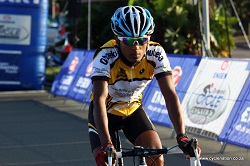 The WCCA started a decade ago, with funding of just 40,000 Swiss Francs. Its philosophy was simple: utilise the knowledge and success of the WCC Switzerland and bring it to Africa. JP also brought his own unique perspective. As a rider who attended Keirin school in Japan, finished 5th in Olympics, was a professional 6-day racer and road sprinter for the Belgian Deschacht Team, he had an intimate and first-hand knowledge of the problems faced by African riders. These extend way beyond the technical challenges of European racing and included the cultural and social adjustments needed to live and race abroad and integrate successfully into the pro peloton.
The WCCA started a decade ago, with funding of just 40,000 Swiss Francs. Its philosophy was simple: utilise the knowledge and success of the WCC Switzerland and bring it to Africa. JP also brought his own unique perspective. As a rider who attended Keirin school in Japan, finished 5th in Olympics, was a professional 6-day racer and road sprinter for the Belgian Deschacht Team, he had an intimate and first-hand knowledge of the problems faced by African riders. These extend way beyond the technical challenges of European racing and included the cultural and social adjustments needed to live and race abroad and integrate successfully into the pro peloton.The WCCA program started with riders attending Potchefstroom for a 2-month training block, twice per year and then returning home. The impact of this was immediate, resulting in South African domination of the 2005 African Championships. The following year the program was increased to provide two 3-month training blocks and by 2007 better funding allowed WCCA to provide a season long training camp. In 2007 other African nations also realised they could compete at the same level as South Africa and the increased funding allowed riders from Eritrea, Ethiopia, Namibia and Rwanda to attend the WCCA. This proved invaluable, allowing many more African nations to qualify for UCI sanctioned cycling events and compete at the 2008 Beijing Olympics.
As Director of the WCCA, economics dictated JP had to be "hands on", fulfilling the roles of coach, logistics manager and 'Director Sportif' at races. As the program grew there was a need for additional staff and for the last 3 years Andrew Smith has been 'Team Manager' and 'Coach', applying science based principles to training, nutrition, athlete testing and recovery.
CONTINUE READING AFTER THIS ADVERTISEMENT
Delivering on promises
 For the last three years, 10 to 12 riders per year have passed through the WCCA program. JP stresses: "To scout talent you need a regional centre. This is important for the development of Africa Cycling. You also need a year with the riders, to see what physical and mental potential they actually have." Since its inception the WCCA has been the feeder team to the MTN-Qhubeka Pro Continental team, acting as the bridge between Africa and Europe for aspiring professional cyclists.
For the last three years, 10 to 12 riders per year have passed through the WCCA program. JP stresses: "To scout talent you need a regional centre. This is important for the development of Africa Cycling. You also need a year with the riders, to see what physical and mental potential they actually have." Since its inception the WCCA has been the feeder team to the MTN-Qhubeka Pro Continental team, acting as the bridge between Africa and Europe for aspiring professional cyclists. 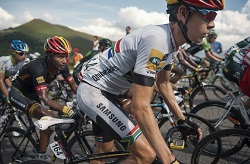 (photo Ilona Kamps, for more photos of the 2014 Vuelta, check out this complete gallery)
(photo Ilona Kamps, for more photos of the 2014 Vuelta, check out this complete gallery)Based on his extensive experience racing in Africa and Europe, JP is very clear about the WCCA's objectives : "Riders will learn how to behave in a professional manner and learn about equipment, nutrition and training. They will learn how to become professional riders and to be competitive at a professional level."
There is no question that WCCA delivers, as Doug Ryder (Team Principle for MTN-Qhubeka Pro Continental team) highlights: "All of our star riders from Africa on our team have come through JP." These include sprinters, climbers, breakaway specialists and of course Grand Tour riders. First division UCI WorldTeams have also recognised the quality of WCCA 'graduates', with Tsgabu Grmay riding the Giro for Lampre-Merida and Dan Craven and Natnael Berhane riding the Vuelta with Europcar.
JP's impact on African cycling is very far reaching, extending from direct coaching to talent identification, as Andrew Smith points out: "JP in his capacity as Director of the World Cycling Centre Africa has played a role or had a hand in the development of almost every single African cyclist in the current professional peloton. That even includes Chris Froome, where JP was instrumental in sending him to the World Cycling Centre in Switzerland."
The future is uncertain
The WCCA has always squeezed the most out its tight budget, as a visit to its garage quickly reveals. All the bikes are second hand with an assortment from Cervélo, Trek, Pinarello and Look. All are passed down from MTN-Qhubeka and the WCC in Switzerland. To repair the bikes and keep them working at minimal cost, JP has recruited the services of Potchefstroom University's engineering department and also confesses to cost cutting measures with the team's logistics. "We rarely ever fly to African races as it's cheaper to drive. We are always the last to arrive and the first to leave. This saves on accommodation costs. We always look for a place with a kitchen, that way the riders can eat the correct meals but at minimal cost." Riders also make their own race food, replacing some of the gels and bars their rivals have with rice cakes. Such methodical cost cutting measures previously allowed WCCA riders to compete in European races. These provided invaluable experience, that was essential for bridging the 'performance gap'. In reference to African riders, JP highlights: "Their endurance is better, their climbing is better, but descending is an issue. They need more exposure to wet narrow roads. And tactics: Europeans have it down to an art and we need to experience it to understand how we can beat them.""It helped me a lot. I am at this level now because of the WCCA and JP van Zyl. The riders in Africa doing local races dream of going to the WCCA because they know it is the best way for them to improve and be good enough to ride in the big races. This was true for me, Merhawi Kudus, Natnael Berhane and other riders who were in WCCA. All of us who currently ride in Europe were at the WCCA, which taught us a lot and opened the door to being professional riders."
Financial support from MTN-Qhubeka more than halved in 2014, resulting in the loss of coach Andrew Smith at the end of the season. It was only because of funding from WCC Switzerland that the WCCA has continued to operate over the past two years. The reduced budget has devastated the WCCA race program and for the first time in three years its riders will not get the chance to compete in Europe. So, just as a decade's work by the WCCA come to fruition, the very roots of African cycling's success are under threat. Not only will this impede the UCI's vision to globalise the sport, it will widen the 'performance gap' between African and European racing.
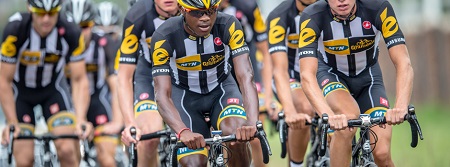
 The President of Cycling South Africa, William Newman, has been particularly eloquent in articulating the importance of the WCCA in MTN-Qhubeka's success and to African cycling.
The President of Cycling South Africa, William Newman, has been particularly eloquent in articulating the importance of the WCCA in MTN-Qhubeka's success and to African cycling. "Team MTN-Qhubeka has surpassed all expectations with its great performances at the Tour de France. They have surprised all with their level of competitiveness and their great results thus far. It is very encouraging to see the former trainees of the WCCA stepping up to the highest level of world cycling and holding their own. This is where the importance of the WCCA's role in identifying and preparing riders cannot be over-emphasised. The work being done at the WCCA is crucial for the continued growth and development of cycling, not only in South-Africa and Africa, but internationally as well. Globalising the sport is a key deliverable for the UCI and the WCCA plays a crucial role here with its continued support of African riders.
We have to ensure that the WCCA is geared up for the influx of riders sparked by Team MTN-Qhubeka's successes. The WCCA under the leadership of Olympian JP van Zyl has shown that it has a winning recipe in identifying and preparing riders with its well-structured training and racing programmes. Everything must be done to ensure that our African riders continue to get this level of support at the WCCA."
Without question the WCCA is currently under threat and while the world celebrates African success at the Tour de France, cycling in Africa now faces its biggest crisis in a decade.
Vond u dit artikel interessant? Laat het uw vrienden op Facebook weten door op de buttons hieronder te klikken!
8 comments | 9163 views
this publication is published in: Behind the scenes of MTN-Qhubeka





 by marco1988 over
by marco1988 over
In the meantime, please don't hesitate to follow Elite Sport Group on Twitter, visit the Elite Sport Group's website or the official WCCA website.
All photos in this article courtesy of WCCA except those credited to Ilona Kamps, GruberImages or Thomas Vergouwen / velowire.com.